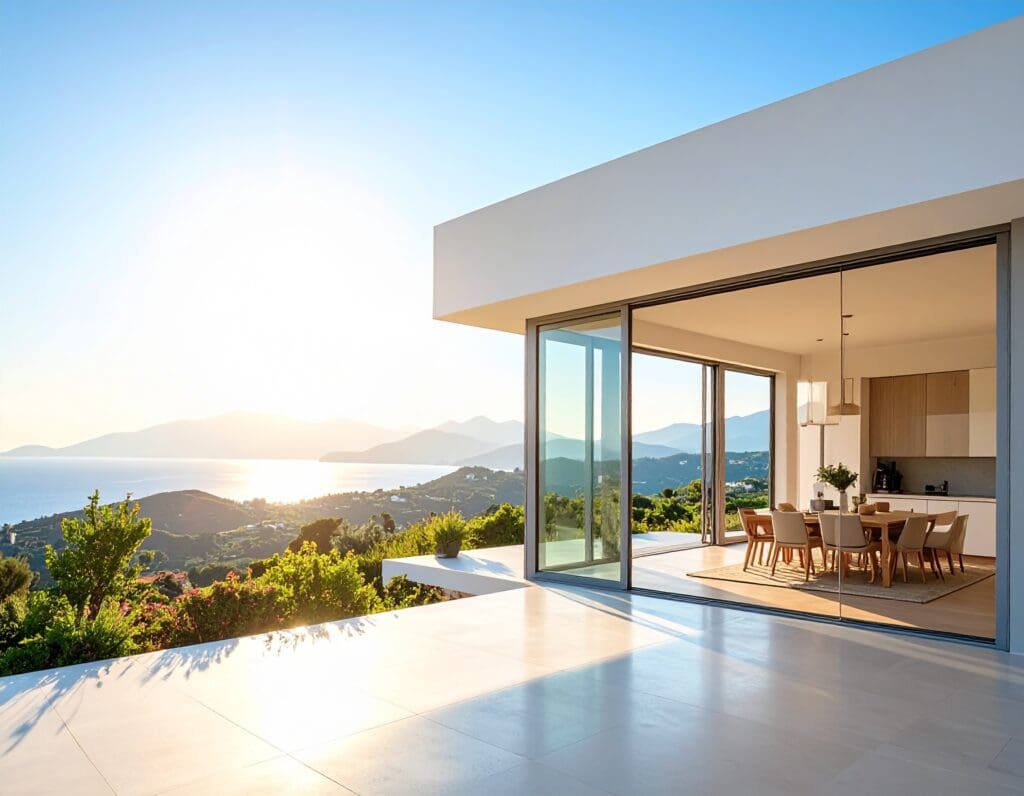As Greece faces rising energy costs and increasingly hot summers, the demand for sustainable building solutions is growing. Vacuum glazing is emerging as a cutting-edge technology that can revolutionise energy efficiency in Greek homes and buildings. By offering superior insulation in a slim, lightweight design, vacuum glazing meets the unique needs of Greece’s climate and architecture.

The Energy Challenges Faced in Greece
Greek households and businesses are spending more on electricity and heating than ever before. With summer temperatures regularly soaring above 35°C, and winters requiring costly heating in northern regions, poor insulation is a major issue. Many older buildings still rely on outdated single glazing or low-efficiency double glazing that allows heat to pass through easily.
In addition, the EU’s climate goals are encouraging greener building practices, putting pressure on architects, builders, and homeowners to upgrade to more sustainable technologies.
What is Vacuum Glazing and How Does it Work?
Vacuum glazing is an advanced type of window glazing that traps a vacuum between two panes of glass. This vacuum eliminates conductive and convective heat transfer, which are the main ways heat passes through traditional glazing. A special low-emissivity coating further reduces radiant heat loss.
Compared to double or even triple glazing, vacuum glazing achieves better thermal performance with a much thinner profile — typically around 8.3mm thick — making it ideal for both new constructions and sensitive renovations.
Why Vacuum Glazing is Perfect for Greece’s Climate
Greece’s climate poses unique energy challenges. Hot summers demand effective solar control, while cooler winters in northern areas require efficient insulation. Vacuum glazing responds to both:
- Cooler interiors in summer: The insulating layer keeps heat out, reducing the need for air conditioning.
- Warmer interiors in winter: The same insulation prevents heat loss, reducing heating costs.
- Ideal for Greek architecture: Whether it’s a modern villa or a neoclassical townhouse, vacuum glazing’s slim design fits seamlessly into a variety of window frames.
Energy Savings and Long-Term Benefits
Switching to vacuum glazing brings a range of benefits:
- Lower energy bills: Less reliance on air conditioning and heating translates to cost savings.
- Sustainability: Reduced energy usage means a lower carbon footprint, helping Greece move toward EU energy targets.
- Durability: Vacuum glazing has a longer lifespan than traditional glazing, making it a smart long-term investment.
Who Should Consider Vacuum Glazing in Greece?
- Architects working on energy-efficient residential or commercial projects
- Builders seeking to integrate sustainable materials into their constructions
- Homeowners renovating to increase comfort and property value while reducing running costs
Whether you’re building new or upgrading old, vacuum glazing can be the cornerstone of a more energy-efficient home.
The Future of Energy-Efficient Windows in Greece
With EU directives pushing for higher building performance standards and Greek energy costs remaining volatile, vacuum glazing is positioned to lead the way. It not only meets current demands but prepares homes and buildings for the future of sustainability.
Now is the time to consider how vacuum glazing can benefit your next project — from comfort and design flexibility to significant energy savings.
Conclusion
Vacuum glazing offers unmatched energy efficiency for homes and buildings in Greece. With its slim profile, superior insulation, and eco-friendly benefits, it is the window solution of the future. Whether you’re an architect, builder, or homeowner, switching to vacuum glazing is a smart move toward a more sustainable and comfortable living space.